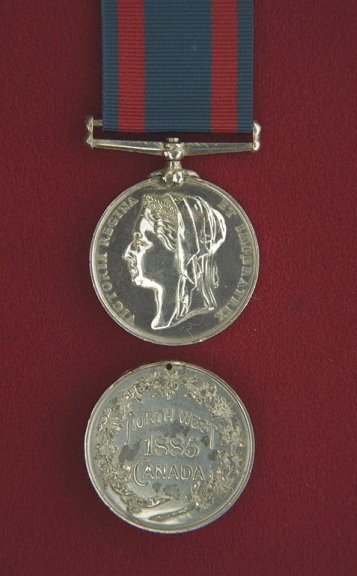Context
The creation of a medal for members of Canadian militia forces who helped suppress the 1885 North West Rebellion was authorized in August 1885. Its design was approved in October 1885.
Eligibility and Criteria
The medal was originally approved for militia members who served west of Port Arthur during the rebellion, prior to 3 July 1885. Award of the medal was also approved for some of the volunteers who participated in key actions, including the crew of the steamer "Northcote" which was recognized for its services at the Battle of Batoche, and members of the Prince Albert Volunteers who fought at Duck Lake. A grant of 320 acres of land or a credit of $80 were also awarded to these recipients.
North West Mounted Police (NWMP) members were initially excluded from receiving the medal. On 10 July 1886, a Canadian Order-in-Council recommended that NWMP personnel who had come under enemy fire also receive it. Medal eligibility was broadened on 20 August 1900 to include all members of the force who had served in the North West Territories during the relevant time period. In the 1930s, surviving NWMP Veterans of the Rebellion also received $300 grants in lieu of the land or monetary credit that had originally been denied to them.
Description
A circular, silver medal, 3.6 centimetres in diameter. For mounting a plain, straight suspender is attached to the medal with a double-toe claw.
On the obverse there is a diademed and veiled effigy of Queen Victoria, facing left, with the legend:
VICTORIA REGINA ET IMPERATRIX.
On the reserve, in three lines within a wreath of maple leaves, is the legend:
NORTH WEST / 1885 / CANADA
The slate grey (blue) ribbon is 3.2 centimetres wide, with crimson stripes (0.6 centimetres wide) running vertically 0.2 centimetres from each edge.
Bars
Saskatchewan bar:
A clasp bearing the word “SASKATCHEWAN” was authorized on 13 December 1886. This was awarded to all those who took part in any or all of the main encounters during the rebellion. These took place along the Saskatchewan River at Fish Creek, Batoche, Cut Knife and Frenchman's Butte.
Members of the NWMP were not part of the militia and there was more latitude in awarding this clasp; all individuals who had been “under fire” were eligible.
Batoche bar:
Some medals have an unofficial bar for the Battle of Batoche.
Historical Notes
- The medal was presented to military recipients unnamed. Many recipients, at their own expense, had their medals engraved with their name.
- Medals later awarded to NWMP members were engraved with the recipient's name prior to presentation. There were 920 medals awarded to members of the NWMP.
- There were 5,650 medals awarded (16 of them to British officers). 1,753 included the Saskatchewan bar.
